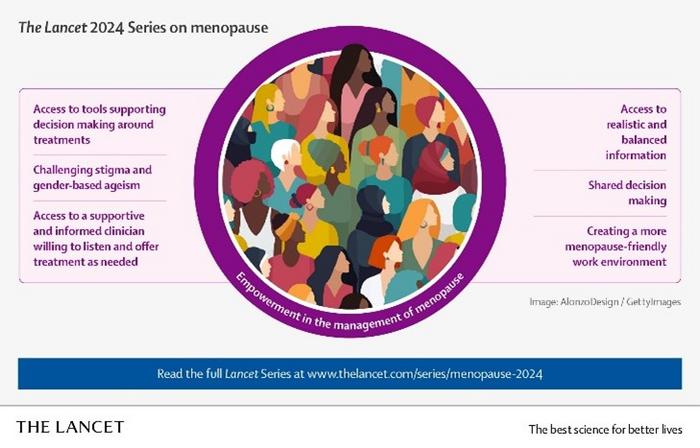A new review paper from authors at Brigham and Women’s Hospital and collaborators concludes that menopause does not uniformly elevate the risk of depression and other mental health conditions.

Credit: The Lancet
A new review paper from authors at Brigham and Women’s Hospital and collaborators concludes that menopause does not uniformly elevate the risk of depression and other mental health conditions.
Menopause has long been thought to cause psychological distress, but a new review suggests that this is not always the case. The review, written by experts from Brigham Women’s Hospital, a founding member of the Mass General Brigham healthcare system, and international collaborators, is the third in a series of menopause-themed papers published in The Lancet. Its authors did not find evidence that menopause universally caused a rise in risk of mental health conditions—including depressive symptoms, major depressive disorder, anxiety, bipolar disorder, and psychosis—across all women.
However, the researchers did find that certain groups are more at risk of mental health during menopause: individuals were more likely to report depressive symptoms if they had previously experienced depression, if their sleep was severely disturbed by nocturnal hot flushes, or if they had a stressful life event concurrent with menopause.
As well as creating negative expectations for people approaching menopause, the potential misattribution of psychological distress and psychiatric disorders to menopause could harm women by delaying accurate diagnosis and treatment, the researchers say.
“The take home message to women and their clinicians is that we shouldn’t assume that if someone has mental health symptoms during the menopause transition that those two things are related,” says co-senior author Hadine Joffe, MD, MSc, the interim chair of the Department of Psychiatry and the executive director of the Connors Center for Women’s Health at Brigham and Women’s Hospital. “We don’t want to invalidate the fact that some people will experience mental health symptoms during the menopause transition, but it’s not guaranteed.”
The menopause transition—the time from when an individual begins to have hormonal and menstrual changes up until their final menstrual cycle—can last four to ten years and begins at 47 years of age, on average. Though menopause is often thought of as emotionally taxing due to hormonal fluctuations, this time of life also coincides with substantial mid-life stresses and life events, such as relationship or job changes, which makes it difficult to tease apart the relative contribution of these factors.
To investigate whether there is an association between the menopause transition and mental health conditions, the researchers reviewed previous studies that looked at the incidence of depressive symptoms, major depressive disorder, anxiety, bipolar disorder, and psychosis during menopause. They placed higher weight on prospective studies that examined mental health pre-menopause as well as during or after the transition, including several studies that were conducted at Mass General Brigham.
They found that, while some studies showed an association between the incidence of depressive symptoms and menopause, more severe clinical depression during menopause only occurred in individuals who had previously been diagnosed with the condition.
“If you’ve never had major depression before, you’re extremely unlikely to have a first episode of clinical depression during the menopause transition,” says Joffe.
Depressive symptoms were also more frequently observed in individuals who experienced a very long menopause transition, individuals who suffered from severely interrupted sleep due to nocturnal hot flashes, and individuals who experienced stressful life events in the 6 months prior to being assessed.
The researchers found no compelling evidence that the risk of anxiety, bipolar disorder, or psychosis are universally elevated during the menopause transition, though there is scarcer literature on associations between these conditions and menopause.
As most menopause studies have been conducted in high income countries, it’s unclear how these results translate to lower- and middle-income regions. There is also little known about how menopause impacts transgender and gender diverse individuals.
These results indicate that hormonal therapy is not an appropriate first-line treatment for clinical depression during menopause, the researchers say. Instead, when patients present with mental health symptoms during menopause, clinicians should consider their background, previous mental health diagnoses, and current life situation.
“We have a negative media image about menopause, but without looking at someone’s mental health prior to menopause, it’s very challenging to understand what might be biologically related to menopause as opposed to life stage or life trajectory,” says Joffe. “Clinicians need to think about what happened before, because depression might be coincident with menopause but unrelated.”
Authorship: Co-authors include Lydia Brown, Myra S Hunter, Rong Chen, Carolyn J Crandall, Jennifer L Gordon, Gita D Mishra, Viktoria Rother, and co-senior author Martha Hickey.
Disclosures: Hunter declares consultation for Rightsteps UK. Joffe declares grant funding from the National Institutes of Health, Pfizer, and Merck; and consulting for Bayer, Merck, and Hello Therapeutics. Hickey is a site investigator for a clinical trial of a medical device for treating vaginal dryness (Madorra).
Paper cited: Brown, L et al. “Promoting good mental health over the menopause transition” The Lancet DOI: 10.1016/S0140-6736(23)02801-5
Journal
The Lancet
DOI
10.1016/S0140-6736(23)02801-5
Method of Research
Data/statistical analysis
Subject of Research
People
Article Title
Promoting good mental health over the menopause transition
Article Publication Date
5-Mar-2024
COI Statement
Hunter declares consultation for Rightsteps UK. Joffe declares grant funding from the National Institutes of Health, Pfizer, and Merck; and consulting for Bayer, Merck, and Hello Therapeutics. Hickey is a site investigator for a clinical trial of a medical device for treating vaginal dryness (Madorra).




